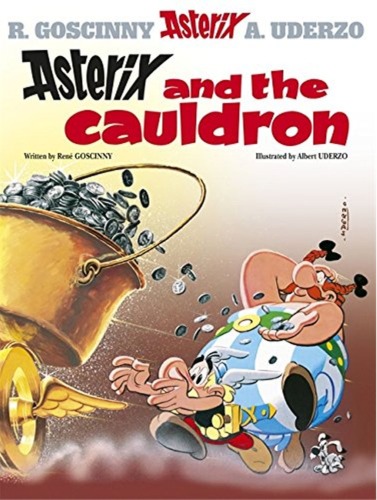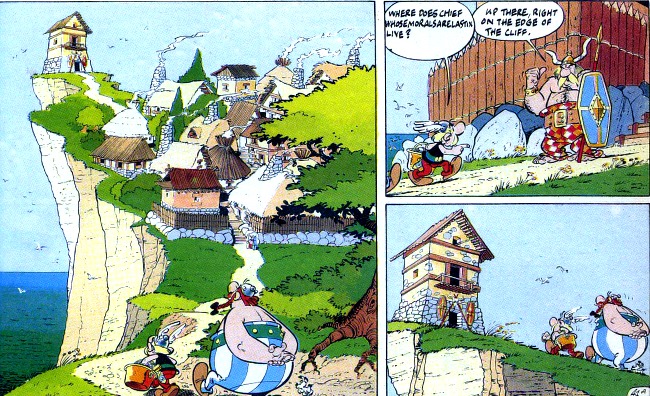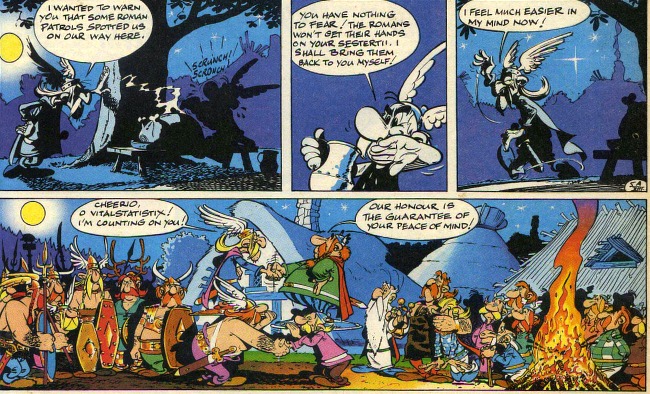Asterix vocabulary
Glossary 4/6: Asterix and the Cauldron
Astérix et le Chaudron, Astérix y el caldero, Astèrix i el calderó, Asterix eta pertza, Astérix e o Caldeirão, Asterix e il paiolo, Asterix und der Kupferkessel, Asterix en de koperen ketel, Asterix och skatten, Asterix ja rahapata, Asteriks ve Kazan.
I can't give you free Asterix books, but for six of them I give you a glossary of all the Latin, and the unusual words, phrases and word games.
The glossary:
- Various gods and goddesses appear in all the Asterix books. Toutatis, Belenos, Belisama, Taranis, Lug, Epona (Gaulish); Jupiter, Mercury, Pluto, Minerva, Apollo, Vesta (Roman); Zeus, Hermes, Hades, Poseidon, Athena, Ares (Greek); Ra, Isis, Osiris, Horus, Anubis (Egyptian).
- Gaul (p3). A province of the Roman empire. Today it's France.
- indomitable (p3). A person who will always resist; unconquerable.
- fortified (p3). Made into a military base with strong walls.
- shrewd (p4). Understands a situation quickly; cunning, clever like a fox.
- a potion (p4). A magical liquid.
- a druid (p4). A Celtic priest.
- a menhir (p4). A megalith, like the big stones at Stonehenge and Carnac.
- a wild boar (p4). A wild pig. Obelix's favourite food.
- mistletoe (p4). A small green plant with white fruit. It grows on trees, and people say it is magical.
- a bard (p4). A poet, musician and teacher.
- majestic (p4). Impressive, like a king.
- glee (p5). An archaic word. Joy, or a music festival.
- Whosemoralsareelastix (p5). The name of a Gaulish chief. Somebody who has “elastic morals” is either almost a criminal or an actual criminal.
- to show up (p6). To arrive, to appear.
- to show somebody up (p6). To make somebody look stupid.
- tax return (p6). The document you send each year to the tax office, to tell them how much money you made in the previous 12 months.
- in their good tablets (p7). A small joke from the common English expression “you're in their good books” which means “you’re popular with them, they like you”.
- redundancy (p10). A thing (or a person) is redundant when it is no longer needed.
- to banish (p11). To force somebody to go away and not come back.
- with your cauldron or in your cauldron (p11). From the classic heroic expression “come back with your shield (i.e. victorious) or on your shield” (i.e. dead).
- a banishing act (p12). A small joke about the theatre magician’s performance, the vanishing act.
- quo vadis? (p13). A military challenge (“Who goes there?”) in Latin.
- vae victis (p14). Latin - “woe to the conquered" (if you are invaded, you have a bad time).
- collective bargaining (p14). Pay negotiations that are carried out with an employer by a trade union.
- solitudinem faciunt, pacem appellant (p15). Latin. A quotation from Tacitus about the Roman way of civilising other countries - “they make it a desert and they call it peace”.
- landlubbers (p16). Literally “land-lovers”. A sailor’s insult for people who are not professional sailors. .
- horse chestnut (p17). There are two sorts of chestnut. You can eat sweet chestnuts, but not horse chestnuts.
- conkered (p17). Horse chestnuts are usually called "conkers". This is a little joke about Julius Caesar’s famous saying “veni, vidi, vici” - I came, I saw, I conquered.
- goose-step (p18). A strange, exaggerated, military march that is used in military ceremonies in many countries including Russia, the Ukraine, Poland, Greece and some countries in South America.
- bolted (p19). If a lettuce gets too big, a gardener would say it bolted. Of course, if we are talking about a horse or a person then “bolted” means “ran away”.
- a gross (p22). A unit of measurement. A dozen is twelve; twelve dozen (144) is one gross.
- velite (p24). A gladiator or infantryman armed with a spear and a Roman short sword (gladius). The velitus did not wear armour or a helmet but he sometimes had a small round shield.
- retiarus (p24). A gladiator armed with a net and a trident (a spear with three prongs like a fork). He wore armour only on one arm, and no helmet.
- Numidian (p24). a man from what is now Algeria and Tunisia.
- a cestus (p24). A metal glove for combat.
- Ave Caesar, morituri te salutant (p26). Latin expression - the gladiator’s salute. “Hail Caesar! We who are about to die salute you.”
- Philistine (p28). An actor’s insult for a person who does not appreciate art.
- a hippodrome (p33). An arena for horse-racing.
- Confidencetrix (p34). A "confidence trickster" or "con man" persuades people to give him money but gives them little or nothing in return.
- Condatum (p37). The town of Rennes in Brittany.
- quid pro quo (p41). Latin - an exchange of something for something. Often means “you do something for me, and I’ll do something for you”.
- precious little (p41). Very little, hardly anything.



